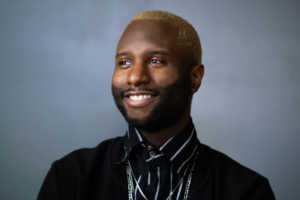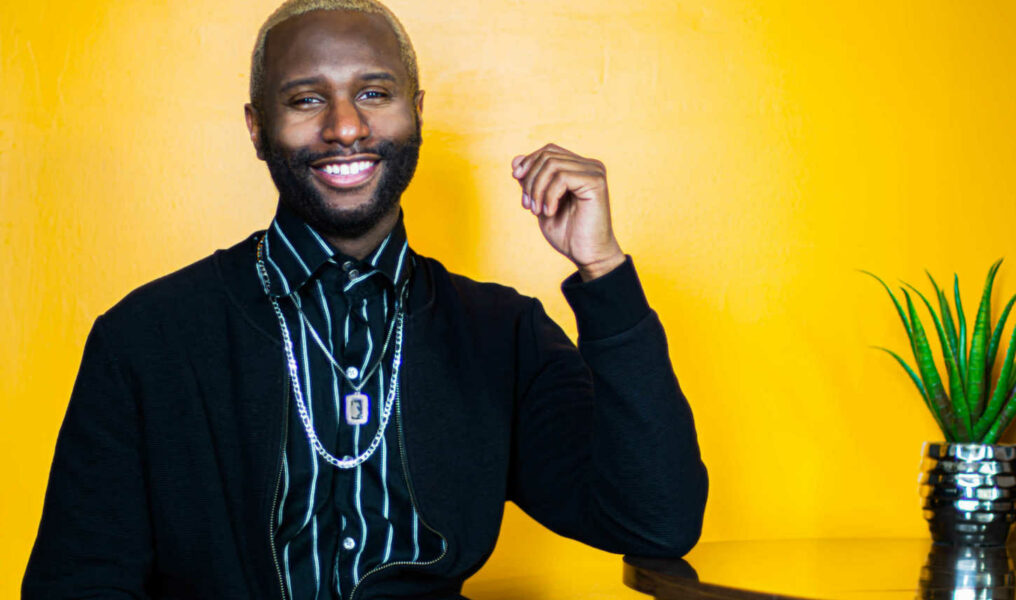Born and raised on the west side of Detroit, Dionté Brown has always loved his hometown. Today, he gives back through his work, and he serves as the program coordinator for LGBT Detroit's Leadership Academy for Mentors and Protégés.
"It's a great opportunity for me to connect with young people and partner them with elders in the community so that they can create relationships, whether it be professionally or personally," he said. "We have a major focus on dispelling HIV stigma and educating young people about HIV and giving them the tools that they need to help advocate for their health care and wellbeing."
A year into this role, by all accounts his longtime love of people and service uniquely has prepared him for working with Detroit's Black queer population, but it didn't always start out that way. At a young age, Brown distanced himself from the vibrancy that is Black queer culture. At the time, his lack of self-awareness and misinformation about what it meant to be LGBTQ+ prevented him from engaging with peers. However, what was once a reason to distance himself became his motivation to advocate for it.
Today, it's Brown's compassion and understanding that gives him the right amount of agency to connect mentors with protégés within his role. Chief among these methods has been through The Hotter Than July Retrospective, a year-long journalism project that promotes diversity and equity in the field while strengthening community engagement by giving Black and Brown LGBTQ+ journalists the ability to tell narratives from their point of view.
Brown made time to discuss the Retrospective, his goals as the Leadership Academy's program coordinator and why it's valuable that Hotter Than July continues on even in the age of COVID-19.
Tell us more about the Hotter Than July Retrospectives project and its significance.
A lot of times we witness our voices being stifled and we're not able to use them as Black and Brown people. The journalism project started and is a way to uplift the voices of the community, allowing them to showcase their work and have it published in a statewide newspaper. That's something they can use to put on their resume or in their portfolio. Plus, it is a paid opportunity for writers and photographers, which dates to April 2020. So, there has been a wonderful opportunity for the community to share in spreading messages of empowerment. And I think that it is so important.
When we're talking about Hotter than July, being able to tell the stories of Hotter than July from different people that have been here from the beginning, people that have been here for over the years, it's beautiful. Because that's something that we tend to forget about our elders who came before us who were able to endure so that we didn't have to.
You describe its significance like oral traditions but in written form.
That's essentially what it is. It's the passing down of the traditions of this illustrious event [Hotter than July] and being able to continue to capture those stories so that they don't go away. And that's the one thing we don't want to do is forget. We don't want to forget where we've come from. And I'm a very big advocate for respecting the elders in this community because of that. Because of them, I'm able to walk outside as a Black gay man with blond hair, because of the things that they had to go through. And I think that is especially important. So, it is just a great project, and I hope we can keep going. I truly do.
How did this partnership with Between the Line come about?
The Retrospective is supported by The Detroit Journalism Fund at the Community Foundation for Southeast Michigan for PrideSource Media and LGBT Detroit. There are a few individuals that are a part of this program, but ours specifically features Black and Brown members of the LGBT community. [LGBT Detroit Executive Director] Curtis [Lipscomb] wanted to essentially take part in the journalism program because he is an editor by trade. LGBT Detroit started as a publication called KICK Magazine.
There are so many different facets that we have to go through as members of this community, and being able to have an opportunity to showcase your work is nothing short of amazing — and be paid for it. My role was to connect our organization with members of the community. Before my involvement, they noticed that the same bodies were getting their work showcased, which is not a problem. You know, I think as a writer, or even as a photographer, having your work published is the goal. You want to do that. But I will say it does take away an opportunity for other individuals to have the same opportunity. And that's what Curtis wanted to focus on with this project which allows different individuals of this community to showcase their work.
Let's talk more about the featured stories and what they entailed.
So, this will be the last feature. There were 12 features in total, and we wanted to focus this one on me, the coordinator of the program. [So I could] talk about the program — where it's been, where it's going and, hopefully, where we can continue. We have this writing project we have piloted in April 2020. We also have the evolution of the Leadership Academy. They're all going through these transitional phases at the moment, but it's beautiful to witness and I'm excited to be a part of it.

Dionté Brown. Courtesy photo.
What is the LGBT Detroit Leadership Academy?
The Leadership Academy has changed over the years. It started in 2012 and is focused on getting people that are a part of the movement to become future leaders in the movement. And a lot of those people who have graduated from the program as members of the community became leaders in the community. However, my area of focus is developing the mentorship program. It's an opportunity to create programming so that protégés can work with their mentors when it comes to various forms of growth such as personal growth and career development. A huge focus is on HIV prevention and dispelling stigmas surrounding gay men and HIV.
Let's say I wanted to become a mentor. Are there certain requirements?
There's not a major requirement, it's just a matter of applying. Once you go through the application process, we then go through I go through it with my executive director. We decide from there and we see if we have a protege that's able to fit with you.
This last year has been a bit of a challenge because of COVID-19. The organization is heavily involved in the community. We're at the local spots where the community resides. We're at the parks. We're at different events throughout the city, but COVID-19 has compelled us to be more creative in our programming.
Since becoming the Leadership Academy's Program Coordinator, what are your goals to ensure that the program continues to be successful through growth and sustainability?
Since the program has pivoted its focus from community leaders to the mentorship and protégée relationship. My biggest goal is developing voices in the community and pairing them with leaders, so that they can become leaders in the community, too. Prior, it was, "Let me help you or guide you in ways so that you can be a leader in the community." Now it's, "Let's pair you with somebody who can guide you to get to where you want to be within different aspects of your life."
Our goal is to partner young people with elders in the community to help them navigate queer life. A lot of times when I was growing up and coming to terms with my sexuality, I didn't have anybody to talk to about it. That's why I do think mentoring is important because it gets them to have somebody in their corner.
From there, we continue to sustain that programming so that our mentors and our protégés want to continue to work with us. We are successful because of those relationships.
Beyond celebrating 25 years of Hotter than July, why was it important to maintain an event like this with everything going on?
Considering the history of Pride, Black gay Pride, this is of the biggest Black gay Pride celebrations in the country — centered here in the city of Detroit — and a lot of people don't know that. When people think Pride, they think Atlanta, they think D.C. They don't think about Detroit. They don't think about something that's been around for over 20 years. 2021 will mark 26 years ‚Ķ and it's important so that this generation understands the history of where we've been, where we are and where we're continuing to go. So, it was essential for us to continue to do this programming and figure out those creative ways to keep it going — COVID-19 or not.










